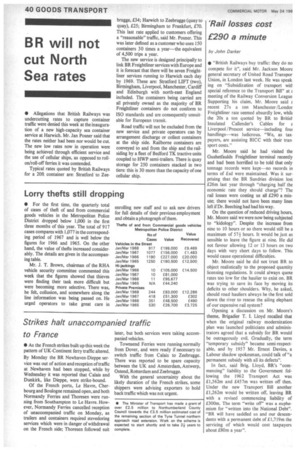'Rail losses cost £290 a minute
Page 42

If you've noticed an error in this article please click here to report it so we can fix it.
by John Darker
• "British Railways buy traffic: they do no compete for it", said Mr. Jackson Moore general secretary of United Road Transpor Union, in London last week. He was speak ing on "Subsidization of transport witl special reference to the Transport Bill" at E meeting of the Railway Conversion League Supporting his claim, Mr. Moore said E recent 27s a ton Manchester /Londor Freightliner rate seemed absurdly low, whilt the 20s a ton quoted by BR to British Insulated Callender's Cables for o Liverpool /Prescot service—including four handlings--was ludicrous. "We, as taxpayers, are assisting BICC with their transport costs."
Mr. Moore said he had visited the Gushetfaulds Freightliner terminal recently and had been horrified to be told that only tonnage records were kept—no records in terms of £sd were maintained. Was it surprising that the BR Sundries division lost £26m last year through "charging half the economic rate they should charge"? The rail losses were costing us all £290 a minute; there would not have been many lines left if Dr. Beeching had had his way.
On the question of reduced driving hours, Mr. Moore said we were now being subjected to "kidology". Despite the increase from nine to 10 hours or so there would still be a maximum of 571 hours. It would be just as sensible to leave the figure at nine. He did not favour allowing 12 or 13 hours on two days with very short days to follow. This would cause operational difficulties.
Mr. Moore said he did not trust BR to object realistically to the proposed quantity licensing regulations. It could always quote rates too low for the haulier to exist on, BR was trying to save its face by moving its deficits to other shoulders. Why, he asked, should road hauliers always be the first sold down the river to rescue the ailing elephant of our expensive rail system?
Opening a discussion on Mr. Moore's theme, Brigadier T. 1, Lloyd recalled that when the original railway modernization plan was launched politicians and administrators agreed that a subsidy for BR would be outrageously evil. Gradually, the term "temporary subsidy" became semi-respectable, and by 1957 Mr. Ernest Davies, a Labour shadow spokesman, could talk of "a permanent subsidy with all its defects".
In fact, said Brig. Lloyd, BR's "commencing" liability to the Government following the 1962 Transport Act was £1,562m and £457m was written off then. Under the new Transport Bill another £1,262m would be written off, leaving BR with a revised commencing liability of £300m. The term "write off" was a euphemism for "written into the National Debt". "BR will have saddled us and our descendents with a permanent debt of £1,719m the servicing of which would cost taxpayers about £80m a year".








































































































































